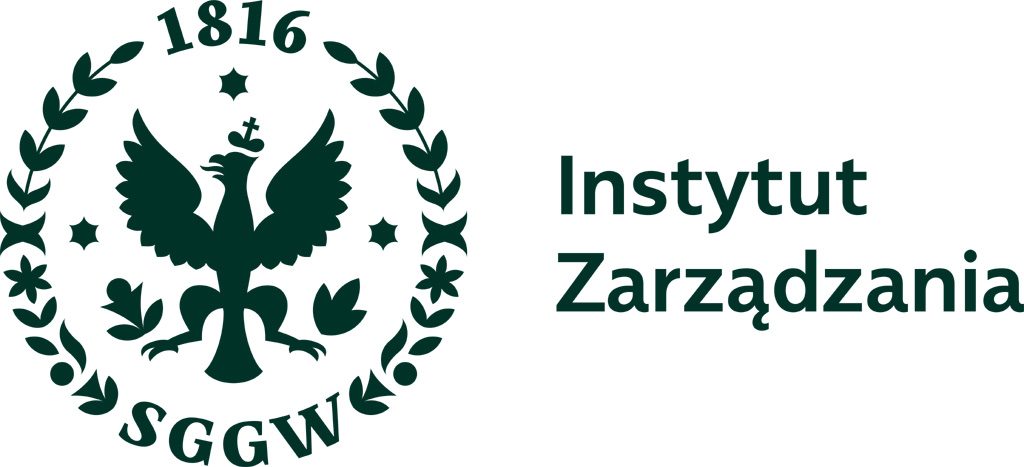Science
Scientific Profiles of Employees
- Prof. dr hab. Joanna Paliszkiewicz
- Prof. dr hab. Tomasz Jałowiec
- Prof. dr hab. Irena Ozimek
- Dr hab. Hanna Górska-Warsewicz, Profesor SGGW
- Dr hab. Wojciech Pizło, Profesor SGGW
- Dr hab. Tomasz Rokicki, Profesor SGGW
- Dr hab. Marcin Ratajczak, Profesor SGGW
- Dr Alicja Fandrejewska
- Dr Monika Gębska
- Dr inż. Sławomir Jarka
- Dr Anna Jasiulewicz
- Dr Olena Kulykovets
- Dr inż. Katarzyna Łukasiewicz
- Dr Piotr Pietrzak
- Dr Ewa Stawicka
- Mgr Edyta Skarzyńska
- Dr Hubert Szczepaniuk
- Dr inż. Agnieszka Tul-Krzyszczuk
- Dr inż. Agnieszka Werenowska
- Dr Barbara Wyrzykowska
- Mgr Elisabeth Koomson
- Mgr Bartosz Kwiatkowski
- Mgr Zofia Lewandowska
- Mgr Adam Łochowski
- Mgr Małgorzata Paprocka
- Mgr Tomasz Zontek
Conferences
-
2nd International Congress on “Blue & Grey Collar Workers, An Alternative Neo-Human Relations Perspective
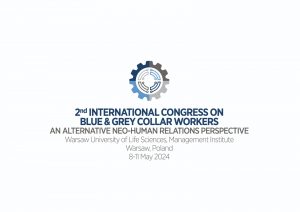
Dear Researchers,
We are honored to invite you to the “2nd International Congress on “Blue & Grey Collar Workers, An Alternative Neo-Human Relations Perspective”. The aim of the conference is to deepen and transfer knowledge about the impact of changes taking place in the global economy on the global workforce in terms of digitization of work processes and ways of interaction between employees of the so-called white, blue, and gray-collar workers. This conference will create an excellent platform for exchanging views on economic changes, bug management culture, the digitalization process on the labor market, and the very current topic related to artificial intelligence and machine learning in the organization, both in the environment of blue and gray-collar workers and white-collar workers.
Main topics of the congress:
- Digital transformation in the organization
- GIG Economy
- Error management
- Gender equality
- Post-pandemic management in the organization
- Identity constructions of employees
- Diversity and discrimination management
- Cybersecurity and privacy in organizations
- Artificial intelligence and machine learning in organizations
- Trust and intuition in management
- Information management systems at the workplace
- Knowledge management
- Motivation and engagement at the workplace
- The development of human resources
- CSR in the organization
KEY DATES
- Start of the Submission: May 01, 2023
- Submission deadline of complete papers or abstracts: December 15, 2023
- Reviews and responses to authors: February 01, 2024
- Submission of the final version of accepted papers or abstracts: February 15, 2024
- Early Bird Registration: until March 15, 2024
- Registration Deadline: April 15, 2024
For more information, please visit https://bgcongress.iz.sggw.pl/
Fb https://www.facebook.com/people/2nd-International-Congress-Blue-Grey-Collar-Workers/100091651639007
If you want to become a participant please click on the link:https://ls.wne.sggw.pl/index.php/333874?lang=en
If you want to become a reviewer please click on the link:https://ls.wne.sggw.pl/index.php/348663?lang=en
Research projects
-
BREED “Promoting empowerment of VET system through sustainable entrepreneurial initiatives in quality pig breeding”
- Project leader: dr inż. Moniki Gębskiej (monika_gebska@sggw.edu.pl)
- Project website: https://www.pigbreedtraining.eu/objectives/
- Film: https://www.youtube.com/watch?v=uAFuvXtasNI&list=UUd1Q_XY2VKzE67zBbHyeGNw
- Facebook: https://www.facebook.com/Erasmus-breed-Empowerment-of-VET-100550901766238
-
Sus Pig Sys – Sustainable pig production systems Systemy zrównoważonej produkcji trzody chlewnej
- Project leader in Poland: Dr inż. Monika Gębska
- Main coordinator: Friedrich-Loeffler-Institut, Germany.
- Project website: https://suspigsys.fli.de/en/home/
-
EU PIG Innovation Group
- Project leader in Poland: Dr inż. Monika Gębska
- Main coordinator: The Agriculture and Horticulture Development Board; (AHDB); United Kingdom
- Project website: https://www.eupig.eu/
-
DIN-ECO: Boosting Digital Innovation and Transformation Capacity of HEIs in an Entrepreneurial ecosystem

DIN-ECO project supports the implementation of Digital Innovation Vision Action Plans (DIVAP) by HEIs of the consortium. Through the DIVAPs, the innovation and entrepreneurial capacity of the participating HEIs will be increased and enable their integration into European innovation value chains and ecosystems. The DIVAPs outline the consortium vision for high-quality, inclusive and accessible digital innovation in Europe.
It is a call to action for stronger cooperation among innovation key players coordinated by HEIs, seen as hubs of innovation and entrepreneurship in the digital age. HEI should educate entrepreneurs to understand the systemic implications of digital innovations and balance economic objectives with social responsibility.
While the application of digital innovation concerns researchers and entrepreneurs of all industries, DIN-ECO creates links between digital innovation and research in the health and manufacturing industries, highlighting the value of innovation-driven research in developing ventures that serve social and industry needs.
DIN-ECO AIMS TO
- Digital Skills
Set up or expand structures within HEIs to enhance students’ digital skills and capacities in innovation and entrepreneurship.
- Collaboration
Foster the collaboration between HEIs and the Enterprises, for exchange of knowledge and good practices in entrepreneurship and innovation.
- Innovation Studies
Introduce, support and enhance entrepreneurial and innovation studies in HEIs through the re- orientation of existing curricula and new education programs.
- Knowledge Transfer
Set up or expand processes within HEIs to facilitate the knowledge and innovation transfer from universities to the market and policymaking centers, and vice versa.
- Research Mechanisms
Create mechanisms for innovation-driven research resulting from collaboration with the partners coming from the industry.
- Self-assessment Support
Support the HEI’s continuous self-assessment of the impact produced by the implemented DIVAP’s actions.
The project’s general objective is to increase the innovation and entrepreneurial capacity of the participating HEIs and enable their integration into European innovation value chains and ecosystems.
These project partners are:
- Ionian University as the lead partner from Greece
- Warsaw University of Life Sciences from Poland
- University of Nis from Serbia
- Aalborg University from Denmark
- Universita degli Studi di Parma from Italy
- Mugla Sitki Kocman University from Turkey
- Found.ation Maker’s Place Private Company from Greece
- A.B. Institute of Entrepreneurship Development LTD from Cyprus
- Fondanzione Fenice Onlus from Italy
You can also follow social media channels to stay updated with DIN–ECO’s next steps and information on the state of digital innovation in Europe:
• Facebook: https://www.facebook.com/DINECOproject
• Instagram: https://www.instagram.com/dinecoproject/
• LinkedIn: https://www.linkedin.com/company/din–eco–project/about/
• Twitter: https://twitter.com/DINECOProject1
• ΤiκΤοκ: https://www.tiktok.com/@dineco_project„DIN-ECO is supported by EIT Digital as part of HEI Initiative program of the European Institute of Innovation & Technology (EIT) (cohort 2) and is funded by the European Union. The HEI initiative aims to support HEIs with expertise and coaching, access to the EIT innovation ecosystem, the largest in Europe, and funding, enabling them to develop innovation action plans complementing the needs of individual HEIs”.
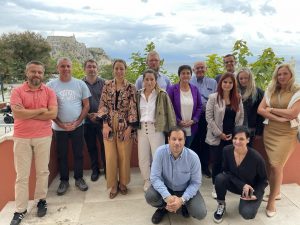

-
Towards effective food waste management and food waste prevention in the food service sector (FoodConscious)

Towards effective food waste management and food waste prevention in the food service sector (FoodConscious)
Project leader in Poland: dr inż. Agnieszka Tul-Krzyszczuk (agnieszka_tul-krzyszczuk@sggw.edu.pl)
Partners:
- Szkoła Główna Gospodarstwa Wiejskiego w Warszawie (Koordynator główny)
- Dimitra Education & Consulting SA (Greece)
- Instituto Para El Fomento Del Desarrollo Y La Formacion Sl – INFODEF (Spain)
- Solski Center Velenje (Slovenia)
- Tiber Umbria Comett Education Programme –TUCEP (Italy)
Project implementation period: 11.2022 – 10.2025 (36 miesięcy)
-
Pathways towards a fair, inclusive and innovative Data Economy for sustainable foods systems Projekt Data4Food2030

- Project leader in Poland: Dr inż. Monika Gębska
- Main coordinator: prof. George Beers, e-mail: mackenzie@foodscalehub.com
- Project website: http://data4food2030.eu
-
Project BroilerNet
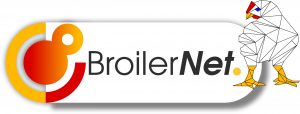
Duration: 4 lata (2022 – 2026)
- Main coordinator: Dr. Stefan Gunnarsson, Swedish University of Agricultural Sciences (SLU) Skara, SWEDEN
- Contact person regarding the project in Poland: dr inż. Monika Gębska monika_gebska@sggw.edu.pl
- Project partners


Publications
-
Paliszkiewicz J., Cusumano J.L.G., (ed.) (2023). Communication, Leadership and Trust in Organizations. Routledge ISBN 9781032440880.
Trust in communication and leadership is the key to success in business. This book presents and discusses the main issues and challenges posed by communication, leadership, and trust. The first part of the book describes the communication and trust issues, the second part presents the role of trust in leadership, and the third part describes different examples of implementing trust to organizations. Readers will gain from this book theoretical and practical knowledge of communication, leadership, and trust; empirically validated practice regarding trust and its related concepts; and a novel approach for addressing this topic. This book can be used as a toolbox to improve understanding and opportunities related to building trust in organizations and will be especially valuable for students and researchers in the fields of leadership, organizational communication, business ethics and trust research.
-
Paliszkiewicz J., Chen K., Gołuchowski J., (ed.) (2023). Privacy, Trust and Social Media. Routledge ISBN 9781032437491.
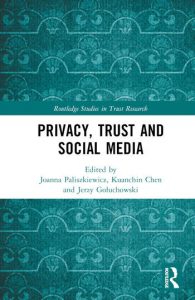
Trust is important – it influences new technologies adoption and learning, enhances using social media, new technologies, IoT, and blockchain, and it contributes to the practical implementations of cybersecurity policy in organizations. This edited research volume examines the main issues and challenges associated with privacy and trust on social media in a manner relevant to both practitioners and scholars. Readers will gain knowledge across disciplines on trust and related concepts, theoretical underpinnings of privacy issues and trust on social media, and empirically-validated trust-building practice on social media. Social Media, Privacy Issues and Trust-building aims to bring together the theory and practice of social media, privacy issues, and trust. It offers a look at the current state of trust and privacy, including a comprehensive overview of both research and practical applications. It shows the latest state of knowledge on the topic and will be of interest to researchers, students at an advanced level, and academics, in the fields of business ethics, entrepreneurship, management of technology and innovation, marketing, and information management. Practitioners can also use the book as a toolbox to improve their understanding and promote opportunities related to building social media trust while taking into consideration of privacy issues.
-
Paliszkiewicz, J. Varoğlu, D. (Eds.) (2023). Management and Organizational Studies on Blue & Grey Collar Workers: Diversity of Collars (International Perspectives on Equality, Diversity and Inclusion). Bingley, UK: Emerald Publishing

The digital transformation of work during the COVID-19 pandemic seemed in many ways a fair treaty between employers and employees. However, realistically, its advantages have primarily benefitted white-collar workers with the ability to work from home, excluding a significant proportion of the global workforce, those responsible for providing fresh water, environmental hygiene, transportation, electricity, healthcare and food and security services, who do not have the option of conducting their jobs remotely. The pandemic has thus deepened the gap between white and blue and grey collar workers.
Combining both theoretical and empirical studies, Management and Organizational Studies on Blue and Grey Collar Workers focuses on recent issues such as digitalization and migration and their implications for organizational commitment, HRM functions and strategic management processes. Acting as an examination of the changing nature of power between blue and grey collar workers and institutional hierarchies in the light of the COVID-19 pandemic, contributors foreground the importance of these roles as a cornerstone for the competitive power of industries and nations, as well as basic global infrastructure, both now and in future.
Highlighting the workers who provide the essential services, maintenance and manufactured goods that power the global economy, Management and Organizational Studies on Blue and Grey Collar Workers supplies essential knowledge on an often overlooked workforce for a variety of disciplines, including human resource management, industrial relations, social psychology, labor economics, gender studies, political science, union studies and health care management.
-
Paliszkiewicz, J., Chen, K., & Launer, M. (Eds.) (2023). Trust and Digital Business: Theory and Practice. USA: Routledge, Taylor & Francis
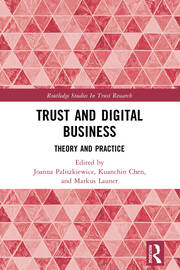
Trust and Digital Business: Theory and Practice brings together the theory and practice of trust and digital business. The book offers a look at the current state, including a comprehensive overview of both research and practical applications of trust in business. Readers will gain from this book in the following areas: knowledge across disciplines on trust in business, theoretical underpinnings of trust and how it sustains itself through digital dissemination, and empirically validated practice regarding trust and its related concepts. The international team of authors from seven countries (Finland, Germany, Italy, Malaysia, Poland, Turkey, and the U.S.) ensures the diversity and quality of the content.
The intended audiences of this book are professionals, scholars, and students.
-
Pizło Wojciech (red.), 2023, Zarządzanie instytucjami kultury. Szkoła Główna Gospodarstwa Wiejskiego w Warszawie, 183 s., ISBN 978-83-8237-113-0
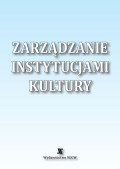
Wybór tekstów będących próbą identyfikacji współczesnych instytucji kultury oraz oceny ścieżek rozwoju sektorów gospodarki kreatywnej. Autorzy podjęli rozważania nad istotą biznesowego i humanistycznego wymiaru instytucji kultury, źródłami oraz strumieniami ich finansowania, a także strategii zarządzania. Wielowątkowa i dualistyczna monografia poruszająca niezwykle aktualne problemy finansowo-zarządcze w przemyśle kreatywnym w aspekcie relacji technologii, kultury, ekonomii i nauki (w tym edukacji), łączy rozważania teoretyczne z opisem doświadczeń organizacji pozarządowych działających w sferze szeroko pojętego sektora kreatywnego.
-
Paliszkiewicz, J., Guerrero Cusumano, J. L., & Gołuchowski, J. (Eds.) (2023). Trust, Digital Business and Technology. Issues and Challenges. USA: Routledge, Taylor & Francis
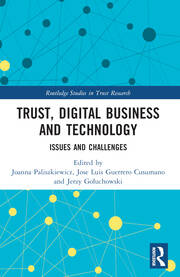
Trust, Digital Business and Technology: Issues and Challenges presents and discusses the main issues and challenges related to digital trust and information technologies. The subject of trust is relevant to both practitioners and researchers. It is widely recognized and confirmed that trust, especially mutual trust, when it is built at the right level, reduces the risk of interaction and increases the collaboration between partners. Readers will gain from this book theoretical and practical knowledge on digital trust; theoretically, well-grounded knowledge on digital trust and related concepts, empirically validated by practice. Most authors have taken innovative approaches to consider issues highlighting a selected aspect of the core theme of this book. The intended audiences of this book are professionals, scholars, and students.
-
Paliszkiewicz, J., Chen, K. (ed.) (2022). Trust, Organizations and the Digital Economy, USA: Routledge, Taylor & Francis Group.DOI:10.4324/9781003165965
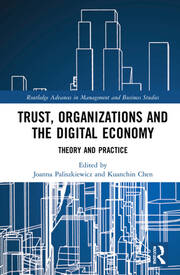
Trust is a pervasive catalyst of human and business relationships that has inspired interest in researchers and practitioners alike. It has been shown to enhance engagement, communication, organizational performance, and online activities. Despite its role to cultivate cooperation, knowledge-sharing, and innovation, trust through digital means or even trust in digital media has presented new opportunities and challenges in society. Examples include a wider and faster dissemination of trust-influencing messages, and richer options of digital cues that engage, disrupt, or even transform how trust is formulated. Despite that, trust helps people to live through risky and uncertain situations, and the many capabilities enabled on the digital platforms have made the formation and sustaining of trust very different compared to traditional means.
Trust in today’s digital environment plays an important role and is intertwined with concepts including reliability, quality, and privacy. This book aims to bring together the theory and practice of trust in the new digital era and will present theoretical and practical foundations. Trust is not given; we must work to build it, but it is a very fragile and intangible asset once built. It is easy to destroy and challenging to rebuild.
Researchers, academics, and students in the fields of management, responsibility, and business ethics will gain knowledge on trust and related concepts, learn about the theoretical underpinnings of trust and how it sustains itself through digital dissemination, and explore empirically validated practice regarding trust and its related concepts.
-
Gębska Monika, Grontkowska Anna, Rekiel Anna [i in.], 2022, Zrównoważona produkcja trzody chlewnej w systemie wolnowybiegowym. Szkoła Główna Gospodarstwa Wiejskiego w Warszawie, 154 s., ISBN 978-83-8237-107-9
-
Pizło Wojciech (red.), 2021, Współczesne obszary zarządzania. Warszawa, Wydawnictwo SGGW, 194 s., ISBN 978-83-8237-036-2

Temat, który podejmuje monografia, jest szeroki, a konsekwencją tego są zróżnicowane podejścia odnoszące się do wielu wątków zarówno teoretycznych, jak i praktyki gospodarczej. Podejście, które prezentują Autorzy i jej Redaktor z założenia powinno inspirować zarówno dyskusję naukową, jak i motywować do działania, a nawet inspirować spory. Wychodząc z założenia, że przez setki lat przedstawiciele różnych zawodów byli dostarczycielami myśli i praktycznych rozwiązań potrzebnych menedżerom do podejmowania trafnych decyzji. Od czasów rewolucji przemysłowej zmieniło się podejście do posiadania, dostępności dóbr, zmieniła się i nadal zmienia się cywilizacja. Rewolucja informacyjna, digitalizacja wielu sfer aktywności społecznej i biznesowej sprawiła, że na nowo weryfikowane są naukowe zasady zarządzania. Krytyce poddawane są dotychczasowe metody wykorzystywane w praktyce zarządzania. Współczesne doświadczenia praktyków zarządzania oraz badaczy akademickich potwierdzają, że dylematy, z którymi przychodzi się mierzyć, są względnie stałe, zmieniają się jednak sposoby identyfikacji problemów, ich ocena, a także sposoby ich rozwiązywania. Pojawiające się pytania badawcze między innymi takie jak – dlaczego niektóre organizacje osiągają sukces na rynku, a inne upadają? Jaka jest rola menadżera w gospodarce? Jaką funkcję pełnią instytucje publiczne w poprawie jakości życia obywateli? Jak zarządzać dobrami publicznymi, by zarządzanie było efektywne? Jak można lepiej wykorzystać swoje zasoby? Jakie innowacje stosowane są w komunikacji współczesnych przedsiębiorstw z rynkiem?
-
Wyrzykowska Barbara (2020). Modele biznesowe współczesnych organizacji. Studium teoretyczno- empiryczne. Wydawnictwo SGGW, Warszawa. ISBN 978-83-7583-998-2

Doktor nauk ekonomicznych, pracownik naukowy Instytutu Zarządzania i wykładowca Szkoły Głównej Gospodarstwa Wiejskiego w Warszawie. Jej działalność naukowo-badawcza koncentruje się głównie wokół zagadnień związanych z kapitałem ludzkim, zarządzaniem kompetencjami oraz nowymi modelami biznesowymi. Autorka i współautorka ponad 100 prac naukowych i popularnonaukowych. Autorka bardzo dobrze zna omawianą problematykę, dobrze się w niej porusza i przedstawia kolejne zagadnienia. Układ pracy pozwala prze-chodzić od spraw bardziej ogólnych do szczegółowych, ukazując różne aspekty omawianych zagadnień, a także ich złożoność […], Zakres cytowanej literatury jest szeroki, ma charakter interdyscyplinarny. Lektura pracy wskazuje, że Autorka potrafiła dobrze przygotować materiał do omawianej problematyki i przedstawić własny, autorski dorobek w tym zakresie. Fragment recenzji prof. dr. hab. Andrzeja Piotra Wiatraka Treści zawarte w monografii wpisują się w potrzebę eksplorowania tego zagadnienia badawczego, zostały dobrane tak, aby z jednej strony-zaprezentować aktualny stan badań na temat modeli biznesu, z drugiej-przedstawić aktualne problemy praktyki gospodarczej. […] Publikacja stanowi wartościowe kompendium wiedzy na temat modeli biznesu współczesnych organizacji. Fragment recenzji dr hab. Krystyny Leszczewskiej
-
Paliszkiewicz, J., (ed.) (2020). Management in the Era of Big Data: Issues and Challenges, Boca Raton, FL, USA: Taylor & Francis Group
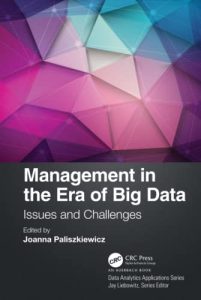
This book is a wonderful collection of chapters that posits how managers need to cope in the Big Data era. It highlights many of the emerging developments in technologies, applications, and trends related to management’s needs in this Big Data era.
―Dr. Jay Liebowitz, Harrisburg University of Science and Technology
This book presents some meaningful work on Big Data analytics and its applications. Each chapter generates helpful guidance to the readers on Big Data analytics and its applications, challenges, and prospects that is necessary for organizational strategic direction.
―Dr. Alex Koohang, Middle Georgia State University
Big Data is a concept that has caught the attention of practitioners, academicians, and researchers. Big Data offers organizations the possibility of gaining a competitive advantage by managing, collecting, and analyzing massive amounts of data. As the promises and challenges posed by Big Data have increased over the past decade, significant issues have developed regarding how data can be used for improving management. Big Data can be understood as large amounts of data generated by the Internet and a variety of connected smart devices and sensors.
This book discusses the main challenges posed by Big Data in a manner relevant to both practitioners and scholars. It examines how companies can leverage Big Data analytics to act and optimize the business. This book brings together the theory and practice of management in the era of Big Data. It offers a look at the current state of Big Data, including a comprehensive overview of both research and practical applications.
By bringing together conceptual thinking and empirical research on the nature, meaning, and development of Big Data in management, this book unifies research on Big Data in management to stimulate new directions for academic investigation as well as practice.
-
Paliszkiewicz, J., (ed.) (2020). Management and Information Technology: New Challenges, Warszawa, Pl: Szkoła Główna Gospodarstwa Wiejskiego w Warszawie.
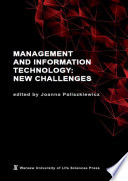
This fifteen-chapter monograph edited by Joanna Paliszkiewicz is an interesting read that focuses on light to moderate topics in the areas of management and information technology. The topics are from cryptocurrencies and their online exchanges in Poland to using the concept of blockchain in agribusiness, using virtual reality, creating knowledge and innovation in family businesses, the importance of social media in education, risk analysis, security and forensic science, and effective communication in enterprises. The monograph continues with topics of CRM/ERP implementation in SMEs in Poland, big data/agri-food industry and innovative solution for knowledge management, the impact of digital technologies on competences, digitization in agriculture, and the impact of merchandising on consumer behaviour. Although there is little connection in terms of reading structure form one chapter to the next, each chapter uniquely stands alone to offer insights into the topic it examines in a very simple and understandable manner.
-
Paliszkiewicz, J., (ed.): Knowledge Management, Trust and Communication in the Era of Social Media, 2020, Multidisciplinary Digital Publishing Institute
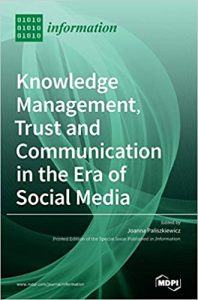
The article entitled “Selected Aspects of Evaluating Knowledge Management Quality in Contemporary Enterprises” broadens the understanding of knowledge management and estimates select aspects of knowledge management quality evaluations in modern enterprises from theoretical and practical perspectives. The seventh article aims to present the results of pilot studies on the four largest Information Communication Technology (ICT) companies’ involvement in promoting the Sustainable Development Goals (SDGs) through social media. Studies examine which communication strategy is used by companies in social media. The primary purpose of the eighth article is to present the relationship between trust and knowledge sharing, taking into account the importance of this issue in the efficiency of doing business. The results showed that trust is vital in sharing knowledge and essential in achieving a high-performance efficiency level. The ninth article presents the impact of social media on consumer choices in tourism and tourist products’ specificity. The study’s main purpose was to indicate the most commonly used social media in selecting a tourist destination and implementing Generation Y’s journey. The 10th article aims to identify the most critical purposes of using social media by responding to women’s attitudes according to age and their respective countries’ economic development. The research was done through an online survey in 2017-2018, followed by an analysis of eight countries’ results. The article entitled “Integrated Question-Answering System for Natural Disaster Domains Based on Social Media Messages Posted at the Time of Disaster” presents the framework of a question-answering system that was developed using a Twitter dataset containing more than 9 million tweets compiled during the Osaka North Earthquake that occurred on 18 June 2018. The authors also study the structure of the questions posed and develop methods for classifying them into particular categories to find answers from the dataset using an ontology, word similarity, keyword frequency, and natural language processing. The book provides a theoretical and practical background related to trust, knowledge management, and communication in the era of social media. The editor believes that the collection of articles can be relevant to professionals, researchers, and students’ needs. The authors try to diagnose the situation and show the new challenges and future directions in this area.
-
Grontkowska Anna, Gębska Monika, (2019) , Dobrostan zwierząt gospodarskich w transporcie. Szkoła Główna Gospodarstwa Wiejskiego w Warszawie, 193 s., ISBN 978-83-7583-910-4
-
Pizło Wojciech, Karpiuk Mirosław, Jednak Sandra [i in.], 2020, Europe's economic development - directions, barriers, consequences. Warszawa, Szkoła Główna Gospodarstwa Wiejskiego w Warszawie, 98 s., ISBN 978-83-7583-964-7
-
Liebowitz, J., Chan, Y., Jenkin, T., Spicker, D., Paliszkiewicz, J., Babiloni, F. (eds.) (2019). How well do executives trust their intuition, Boca Raton, FL, USA: CRC Press, Taylor & Francis Group, Auerbach Publications.

In this age of Big Data and analytics, knowledge gained through experiential learning and intuition may be taking a back seat to analytics. However, the use of intuition should not be underestimated and should play an important role in the decision process.
How Well Do Executives Trust Their Intuition covers the Fulbright research study conducted by this international team of editors. The main question of their investigation is: How well do executives trust their intuition? In other words, do they typically prefer intuition over analysis and analytics. And equally importantly, what types of intuition may be most favorable looking at different variables? The research utilizes survey and biometrics approaches with C-level executives from Canada, U.S., Poland, and Italy.
In addition, the book contains chapters from leading executives in industry, academia, and government. Their insights provide examples of how their intuition enabled key decisions that they made.
This book covers such topics as:
- Using intuition
- How gender, experience, role, industry, and country affect intuition
- Trust and intuition in management
- Trusting intuition
- It’s a matter of heart
- Leadership intuition and the future of work
- Creating an intuitive awareness for executives
- Improvisation and instinct.
The book explores how executives can use intuition to guide decision making. It also explains how to trust intuition-based decisions. How Well Do Executives Trust Their Intuition is a timely and prescient reminder in this age of data-driven analytics that human insight, instinct, and intuition should also play key roles.
-
Pizło Wojciech, 2019, Marketing międzynarodowy : europejski punkt widzenia. Szkoła Główna Gospodarstwa Wiejskiego w Warszawie, 209 s., ISBN 978-83-7583-892-3
-
Paliszkiewicz, J., (2019). Przywództwo, zaufanie i zarządzanie wiedzą w innowacyjnych przedsiębiorstwach [Leadership, trust and knowledge management in innovative enterprises], CeDeWu, Warszawa, PL, 2019.

Innowacyjność przedsiębiorstw jest uznawana za jeden z kluczowych czynników decydujących o ich przewadze konkurencyjnej. Poszukiwania zasobów i zdolności przedsiębiorstw, które wspierają kreowanie innowacji skłoniły autorkę do badań w tym obszarze. Celem książki jest przedstawienie podstaw teoretycznych i ustaleń empirycznych w zakresie roli przywództwa, zaufania i zarządzania wiedzą w kreowaniu innowacyjności przedsiębiorstw.
Autorka w książce wnikliwie analizuje takie aspekty, jak:
• istota, modele i pomiar przywództwa,
• pojęcie, cechy, rodzaje i budowa zaufania w organizacji,
• koncepcja, procesy i modele dojrzałości zarządzania wiedzą,
• ewolucja, cechy, rodzaje i procesy innowacji,
• relacje pomiędzy przywództwem, zaufaniem, zarządzaniem wiedzą i innowacyjnością.Książka jest adresowana do osób zajmujących się badaniami zasobów ludzkich i ich roli w organizacjach, jak również menedżerów i specjalistów z zakresu zarządzania.
-
Gębska Monika, Gołębiewska Barbara, Grontkowska Anna, 2018, Dobrostan zwierząt gospodarskich : od teorii do praktyki. Warszawa, Szkoła Główna Gospodarstwa Wiejskiego w Warszawie, 177 s., ISBN 978-83-7583-826-8
-
Kożuch, B., Magla, S., Paliszkiewicz, J., (eds.) (2018) Managing Public Trust
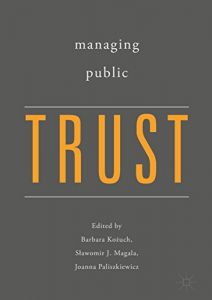
This book brings together the theory and practice of managing public trust. It examines the current state of public trust, including a comprehensive global overview of both the research and practical applications of managing public trust by presenting research from seven countries (Brazil, Finland, Poland, Hungary, Portugal, Taiwan, Turkey) from three continents. The book is divided into five parts, covering the meaning of trust, types, dimension and the role of trust in management; the organizational challenges in relation to public trust; the impact of social media on the development of public trust; the dynamics of public trust in business; and public trust in different cultural contexts.
-
Liebowitz, J., Paliszkiewicz, J., Gołuchowski, J. (eds). (2018) Intuition, Trust, and Analytics, Boca Raton, FL, USA: CRC Press, Taylor & Francis Group, Auerbach Publications

In order to make informed decisions, there are three important elements: intuition, trust, and analytics. Intuition is based on experiential learning and recent research has shown that those who rely on their “gut feelings” may do better than those who don’t. Analytics, however, are important in a data-driven environment to also inform decision making. The third element, trust, is critical for knowledge sharing to take place. These three elements―intuition, analytics, and trust―make a perfect combination for decision making. This book gathers leading researchers who explore the role of these three elements in the process of decision-making.
-
Mazurkiewicz-Pizło Anna, Pizło Wojciech, 2017, Marketing :wiedza ekonomiczna i aktywność na rynku. Warszawa, Wydawnictwo Naukowe PWN, 268 s., ISBN 978-83-01-19624-0
-
Paliszkiewicz, J., Koohang, A. (2016) Social Media and Trust: A Multinational Study of University Students, Santa Rosa, CA, USA: Informing Science Press

Researchers and practitioners alike often overlook the vital relationship between trust and social media. … Authors Joanna Paliszkiewicz and Alex Koohang charted a course to explore this abyss with a view to answering the question how does trust influence the use of social media.
[i]Dr. John P. Girard, Peyton Anderson Endowed Chair in Information Technology, Middle Georgia State University[/i]
The authors have done an excellent job in explaining how trust plays a significant role in social media. The book begins with a thorough overview of social media to its applications in learning, business, and an analysis of social media and trust. The second part of the book uses data from four different countries to answer multiple valid and vital research questions dealing with social media and trust, including an instrument that measures trust variables.
This book presents some meaningful work on how the integration of social media and trust can best be developed. The authors apply their backgrounds in information technology, knowledge management, trust, and business to generate some provocative and instructive guidance to the readers on how to best leverage knowledge internally and externally to meet the organizational strategic goals.
[i]Dr. Jay Liebowitz, Distinguished Chair of Applied Business and Finance, Harrisburg University of Science and Technology
-
Wereda, W., Paliszkiewicz, J., Lopes, I. T., Woźniak, J. Szwarc, K. (2016). Intelligent Organization (IO) towards Contemporary trends in the process of management – selected aspects, Warsaw, PL: Military University of Technology.
This book is devoted to the discussion of the selected key issues related to the problem of intelligent organizations in theory and practise of the contemporary management. The problem is analysed as the correlation of various factors. The main impact is however seen from the perspective of the business and public sector seriously affected in terms of the process of management. The main role is broadly elaborated on as the key element in providing stability for the contemporary organizations.
-
Paliszkiewicz, J., Ingaldi, M. (eds.) (2016). Teoria i praktyka w zarządzaniu produkcja i usługami, [Theory and practice in production and service management], Częstochowa PL: Oficyna Wydawnicza Stowarzyszenia Inżynierii Produkcji i Jakości.
-
Paliszkiewicz, J., (2014). Zaufanie w zarządzaniu, [Trust in management]. Warszawa, PL:, Wydawnictwo naukowe PWN.

Obecna rzeczywistość gospodarcza wymusza na przedsiębiorstwach konieczność współpracy w strategicznych, często bardzo kosztownych i ryzykownych obszarach działalności, takich jak np. badania i rozwój. Jednocześnie zadania delegowane na pracowników są coraz bardziej złożone, a wiedza i informacja są główną wartością organizacji, czego przykładem może być działalność firm consultingowych. Wszystkie te aspekty wymagają od przedsiębiorstw uwzględnienia tak ważnego czynnika, jakim jest zaufanie.
Autorka wnikliwie analizuje takie aspekty zaufania w zarządzaniu, jak:
- zaufanie w teoriach zarządzania zasobami ludzkimi, zarządzania wiedzą oraz zarządzania kryzysem,
- zarządzanie i kreowanie zaufania w zarządzaniu przedsiębiorstwem,
- zaufanie w relacjach między współpracownikami, podwładnymi i przełożonymi,
- zaufanie między partnerami biznesowymi oraz między firmą i jej klientami.
Teorie przedstawione w książce poparte są badaniami przeprowadzonymi na grupie polskich przedsiębiorstw.
Książka adresowana jest do osób zajmujących się badaniami kapitału ludzkiego, menedżerów i specjalistów z zakresu zarządzania i socjologii zarządzania. Może być wykorzystana również w procesie dydaktycznym na uczelniach wyższych do przedmiotu – zarządzanie zaufaniem.
-
Paliszkiewicz, J. (2007). Zarządzanie wiedzą w małych i średnich przedsiębiorstwach – koncepcja oceny i modele, [Knowledge management in small and medium enterprises – concept of estimating and models], Warszawa PL: Wydawnictwo Szkoły Głównej Gospodarstwa Wiejskiego w Warszawie.
-
Paliszkiewicz, J. (2005). Rozwój organizacji poprzez zarządzanie kapitałem intelektualnym [Development of organization by management of intellectual capital], Ostrołęka, PL: Wydawnictwa Profesjonalne ALPHA pro.
